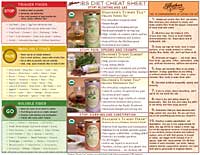A New Way to Live
IBS requires a bit of work when it comes to dietary planning, but the peace of mind that results from reducing your risk of attacks is a powerful motivating force. It's important to concentrate on the fact that you now have the knowledge required to take control of this problem, and to know that you will gain confidence as you change your life for the better.Realize that you must develop the ingrained habit of thinking carefully about what you will be eating each and every day. Accept the time and planning this outlook requires as an utter necessity for your health and happiness. With a little practice you can easily incorporate this mindset into your life; eventually diet planning will become an automatic function, and a fundamental part of your daily routine just like sleeping and eating.
Many people with IBS already spend time every day worrying about their problem, afraid they will suffer a sudden attack and the stress of trying to deal with it. It is an empowering change to instead spend this time ensuring that the problem will be solved for the day by eating what will help and not hurt.
In order to routinely know in advance exactly what you will be eating the next day, it is crucial that you make your diet a priority in your life: have a designated day of the week to grocery shop, and specific times set aside throughout the week to cook. Have the next day's meals and snacks identified before you go to bed at night. It may help to actually make a list of exactly what you'll be eating the following day.
Make sure you always have plenty of snack foods available at home and at work. Take regular inventories of your pantry and freezer and keep a generous supply of safe staples (breads, dry cereals such as Corn Chex, Rice Chex, Kix, Honeycomb, Corn Pops, fat free crackers, rice, pasta, home dried bananas, soy/rice milk, mint tea, etc.) on hand at all times. Consider buying a rice cooker. They're inexpensive and foolproof, and it's very helpful to have a constant supply of cooked rice in the fridge. Your goal is to never be caught without something safe to eat. Have your meals and snacks mentally planned long before you are actually hungry.
Remember that IBS often runs in cycles. Once your body is working well it will tend to continue that way. Conversely, if you are having frequent attacks, you must break the cycle. Accept that you need to give yourself special attention, relax, and realize that you will have to strictly limit your diet for several days, with no exceptions. This may mean literally living on bread and water, but it is important to listen to your body and not worry or feel guilty about your diet at this time. If you need to skip work or school, or cancel appointments, so be it. Allow yourself to just stay home all day and rest. If you can go for a slow and easy walk outside, try to do so. If you can't, you can't. Get extra sleep, indulge yourself with good books, trashy television, or whatever else easily occupies your mind and relaxes you. Remind yourself that you will recover, your digestion will stabilize, and you will be able to become more active and expand your diet.
Remember that you are the only person who has to be happy with your diet. No one else needs to understand or approve of what you can and cannot eat. Don't worry about what others think - your health is more important than avoiding their criticism.
Take immediate control of your symptoms with Eating for IBS.
Continue reading Eating for IBS
|
 Excerpted from Eating for IBS. |
All content is copyrighted by Heather Van Vorous and MAY NOT BE REPRODUCED without permission.

